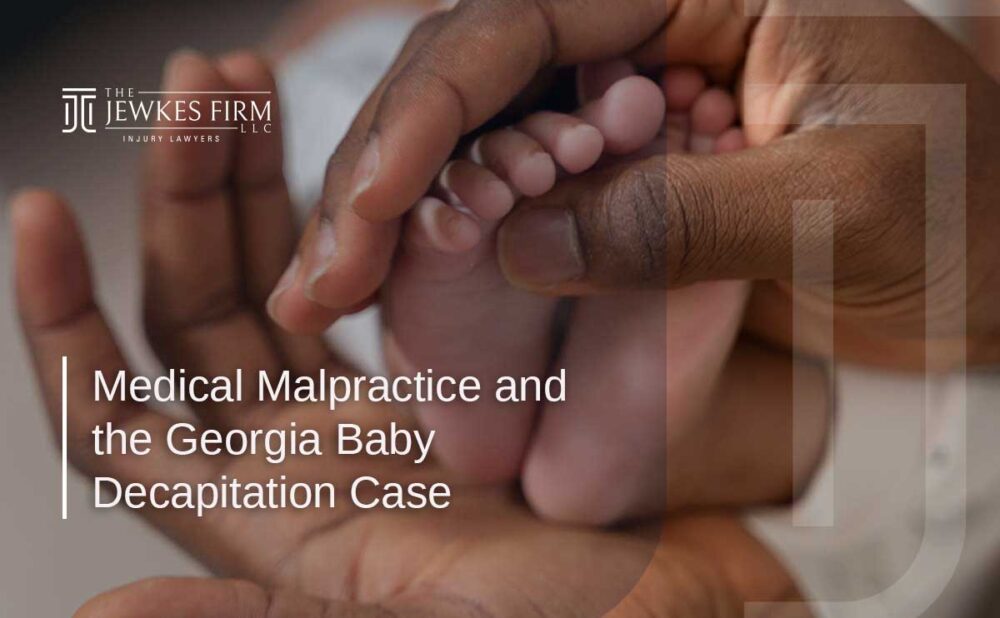Medical Malpractice and the Georgia Baby Decapitation Case
A Tragic Intersection of Birth Injury and Privacy Violations
In a tragic case in Georgia, the attending doctor applied excessive force during delivery, resulting in the decapitation of a couple’s baby. The baby became stuck in the birth canal due to shoulder dystocia, and improper medical handling led to the fatal injury. Despite efforts to save the baby, the infant’s death was later determined to be a result of medical malpractice.
Adding to the family’s suffering, a pathologist hired to perform an autopsy, posted graphic images and videos of the infant’s body on social media without the parents’ consent. This breach of privacy led to a civil lawsuit, culminating in a $2.25 million verdict in favor of the grieving parents, which included compensatory and punitive damages.
The case highlights critical issues surrounding medical malpractice, privacy in healthcare, and the legal responsibilities of medical professionals. It serves as a reminder of the emotional and legal consequences that can arise from negligence in childbirth and unauthorized sharing of sensitive postmortem content.
The Birth Injury — How the Medical Tragedy Unfolded
In July 2023, a Georgia couple, Jessica Ross and Traveon Isaiah Taylor Sr., experienced an unimaginable tragedy during childbirth. The medical staff decapitated their newborn son, Treveon Isaiah Taylor Jr., during delivery at Southern Regional Medical Center in Riverdale, Georgia. The Clayton County Medical Examiner later ruled the death a homicide, citing excessive force applied during the delivery as the cause.
Southern Regional admitted Jessica Ross, who was 20 years old at the time, after her water broke on July 9 2023. During labor, the baby became stuck in the birth canal due to shoulder dystocia—a condition where the baby’s shoulder gets caught behind the mother’s pelvic bone. Despite attempts at vaginal delivery, the attending obstetrician, Dr. Tracey St. Julian, allegedly applied excessive traction to the baby’s head and neck. When these efforts failed, the medical team performed a Cesarean section, but the timing was too late to prevent the decapitation.
The hospital staff reportedly discouraged the parents from holding their deceased child and suggested cremation, actions that further deepened the family’s distress. They were only allowed to view their baby through a glass window, with the infant’s head concealed, leading to claims of an attempted cover-up.
The Pathologist’s Breach of Privacy
In the aftermath, the parents hired Dr. Jackson Gates to conduct an independent autopsy. However, Dr. Gates posted graphic images and videos of the autopsy on his public Instagram account without the family’s consent. Despite initially removing the content following a cease-and-desist letter from the parents’ attorneys, he later reposted the material. Dr. Gates defended his actions, stating the posts were for educational purposes and did not identify the child. He argued that he had the right to share such content under the Health Insurance Portability and Accountability Act (HIPAA) because he did not disclose the identity of the deceased.
Legal Proceedings and Verdict
In September 2023, the parents filed a lawsuit against Dr. Gates and his company, Medical Diagnostic Choices, alleging invasion of privacy, intentional infliction of emotional distress, and fraud. In March 2024, a Fulton County judge ruled in favor of the parents by default, as Dr. Gates failed to respond to the lawsuit. The case proceeded to a damages trial, where a jury awarded $2 million in compensatory damages and $250,000 in punitive damages, the maximum allowed under Georgia law.
The jury’s decision emphasized the importance of respecting the emotional and privacy rights of individuals, particularly in sensitive matters such as postmortem examinations. While Dr. Gates claimed no intent to harm, the court found his actions to be a gross violation of the family’s trust and privacy.
Affected By A Birth Injury? Contact Us For A Free Consultation
Affected By A Birth Injury?

Broader Implications — A Deeper Look into Medical Malpractice, Privacy, and Legal Accountability
The tragic case of the Georgia couple highlights several critical issues. This case has broader implications for the healthcare system and raises important questions for the legal system. In this context, three primary areas of concern stand out:
Medical Malpractice and Birth Injuries
Privacy in Medical Practice
Legal Accountability
These topics are significant, as they address systemic issues within the medical profession, the need for stronger protections for patients and their families, and the consequences of failing to uphold those standards.
Medical Malpractice and Birth Injuries
The tragic death of Treveon Isaiah Taylor Jr. underscores the potential consequences of medical negligence during childbirth. Shoulder dystocia is a recognized obstetric emergency, and failure to manage it appropriately can lead to severe outcomes.
What Is Medical Malpractice?
Medical malpractice refers to professional negligence by a healthcare provider that leads to substandard care and harm to a patient. In birth injury cases, such negligence can manifest in various forms, such as failure to properly monitor the mother and baby, incorrect use of medical tools, or improper handling during delivery.
Birth Injuries — A Complex and Devastating Issue
Childbirth is one of the most complex and delicate medical procedures. While medical advancements have made childbirth safer over the years, it remains a high-risk event, especially for the mother and newborn. A birth injury, particularly one as severe as the decapitation of a baby during delivery, can have long-lasting physical, emotional, and financial effects on the parents.
Proper care could have prevented Treveon Isaiah Taylor Jr.’s death. The baby’s shoulder became stuck in the birth canal, leading to shoulder dystocia. Shoulder dystocia occurs when the baby’s shoulder gets caught behind the mother’s pelvic bone during delivery, which is a known complication of labor. The excessive force used to deliver the baby, according to the medical examiner’s report, led to the fatal injury.
Medical Malpractice in Birth Injuries — Causes and Prevention
- Failure to Act Swiftly. One of the key issues in this case is the delayed response to the shoulder dystocia. Quick and appropriate action by the attending doctor, including the use of certain maneuvers (such as the McRoberts maneuver or suprapubic pressure), might have saved the baby.
- Improper Use of Force. The excessive force used during the delivery led to severe consequences. A trained obstetrician should know how much force is safe to apply during delivery to avoid injury to the baby.
- The Importance of Monitoring and Reporting. Proper monitoring of both the mother and the baby is essential during labor. In cases where complications arise, the medical team must act quickly and communicate the risks to the family. The failure to inform the parents about the risks, as well as discouraging them from holding their deceased child, exacerbated the emotional trauma.
Legal Consequences of Medical Malpractice
Medical malpractice lawsuits involving birth injuries often result in significant financial settlements, as seen in this case. Birth injury cases are inherently emotional and sensitive, which can make them more difficult to prosecute but also underscores the need for justice and accountability. In this case, the jury awarded a $2.25 million verdict to the grieving parents, highlighting the legal system’s recognition of the emotional and financial toll of birth-related malpractice.

GEORGIA PERSONAL INJURY LAWYER NEAR ME
Privacy in Medical Practice
The unauthorized sharing of postmortem images raises significant ethical and legal questions about patient and family privacy. Medical professionals must navigate the balance between educational purposes and respecting the dignity of the deceased and their families.
Breach of Privacy — A Grave Violation
The case involving the Georgia couple’s baby takes a turn when we examine the breach of privacy committed by Dr. Jackson Gates. After performing the autopsy, he posted images and videos of the deceased baby’s body on social media without the parents’ consent. This is a significant violation of patient confidentiality and personal dignity, which is at the heart of medical ethics and laws.
Medical Privacy Laws — HIPAA and Beyond
Congress enacted the Health Insurance Portability and Accountability Act (HIPAA) in 1996 to safeguard patients’ medical information and protect their privacy. HIPAA governs the handling of patient data and provides strict guidelines on the disclosure of sensitive information, including postmortem images or records.
Dr. Gates argued that he did not violate HIPAA because the baby’s identity was not disclosed. However, his actions still constitute an ethical violation. The very nature of the posts — graphic depictions of an infant’s autopsy — goes beyond any reasonable educational or public interest grounds and causes harm to the grieving family. This family deserves to have their privacy respected. The medical community must understand that there are ethical boundaries when it comes to sharing sensitive information.
The Importance of Consent in Medical Practice
In this case, the family’s lack of consent to the dissemination of the autopsy images demonstrates a fundamental lapse in medical professionalism. Consent is both a legal and ethical requirement. The surviving family members should control how they share their personal and sensitive information.
Dr. Gates’ decision to post the images without consent raises questions about what constitutes professional conduct within the medical field and the need for heightened sensitivity in handling patient-related content, especially in cases involving grief and trauma.
Medical Education vs Privacy Protection
Medical images and videos can be used educationally. However, this must be balanced with the need to protect privacy. In an age where social media has become ubiquitous, it is crucial for medical professionals to understand that the public sharing of autopsy images — particularly in a case involving a child — goes well beyond educational purposes and can deeply harm the family involved. As we see in this case, the legal and emotional consequences of such a breach are significant.
Need a Free Consultation? Need a Skilled Attorney?
Free Consultation
Call (770) 771-5130
If you’ve been injured, you need to hire the best legal care to assist you with your claim. Get a FREE consultation today!
Legal Accountability
The substantial verdict serves as a reminder of the legal responsibilities healthcare providers have toward their patients and their families, both in medical practice and in handling sensitive information.
Legal Liability in Medical Malpractice
The legal system holds healthcare professionals accountable for their actions through malpractice claims. In cases of medical negligence, courts aim to ensure that the injured parties receive fair compensation for the harm caused to them. Medical professionals and institutions can face liability for injuries sustained during childbirth, especially if they provided substandard care.
In the case of the Georgia couple, the court found that the hospital and medical staff had contributed to the fatal injury during childbirth. This formed the basis for their legal action, which led to the jury awarding $2.25 million in damages. The lawsuit was not only about financial compensation but also about seeking justice for a devastating tragedy.
Punitive Damages — Deterrence of Future Violations
The award of punitive damages — in addition to compensatory damages — signifies that the jury found the actions of Dr. Gates and the medical staff to be egregious and deserving of further punishment. Punitive damages are meant to act as a deterrent against future misconduct by professionals and institutions. In the case of medical malpractice, punitive damages send a clear message that violations of medical standards and personal privacy will not be tolerated.
The Need for Medical Reform
Cases like these highlight the potential need for reforms in both the legal and healthcare systems. For example:
- Stricter Regulations on Social Media Use. Healthcare providers and medical professionals must be held to stringent standards when it comes to the sharing of patient-related images and data on social media. Hospitals should introduce policies that address the handling of sensitive material and the importance of obtaining proper consent before sharing such content.
- Training for Healthcare Providers on Ethical and Legal Boundaries. Comprehensive training on ethics and privacy laws should be mandatory for all medical professionals. This would ensure that medical practitioners understand the legal and emotional consequences of breaching patient privacy.
- Improved Transparency and Communication. Medical malpractice lawsuits often arise from a lack of communication between healthcare providers and families. It is essential for doctors and medical staff to have transparent conversations with patients and their families about risks, procedures, and outcomes. This could potentially prevent both medical errors and legal disputes.

The Importance of Hiring a Personal Injury Attorney Specializing in Medical Malpractice and Birth Injuries
When dealing with medical malpractice or birth injuries, especially in the complex legal landscape of Georgia, hiring a personal injury attorney who specializes in these areas can make a significant difference in the outcome of your case. Here are some key reasons why it is essential to seek legal representation from an attorney experienced in medical malpractice and birth injury cases:
- Expert Knowledge of Medical Laws and Regulations
- Ability to Investigate and Gather Evidence
- Understanding of Birth Injury Complications
- Effective Negotiation and Settlement
- Representation in Court
- Advocacy for Long-Term Care Needs
- Peace of Mind and Support
- Maximizing Your Compensation
Ultimately, hiring an attorney with expertise in medical malpractice and birth injuries maximizes the chances of a successful outcome, ensuring that victims receive fair compensation for their losses. The Jewkes Law Firm is here to help during this challenging time. Reach out to us today at (770) 771-5130 for a free consultation.
A Cautionary Tale
The case of Jessica Ross and Traveon Isaiah Taylor Sr. is a poignant reminder of the vulnerabilities families face during childbirth and the profound impact of medical professionals’ actions on their lives. While the $2.25 million verdict cannot undo the harm caused, it represents a step toward justice and accountability in the medical field. It also serves as a cautionary tale about the importance of ethical conduct and respect for privacy in all aspects of medical practice.
The tragic case of the Georgia couple’s baby decapitated during childbirth, coupled with the subsequent privacy violation by the pathologist, shines a light on key issues in the healthcare system, including medical malpractice, the importance of patient privacy, and the legal accountability of healthcare providers.
This case serves as a reminder of the devastating impact that substandard care and breaches of trust can have on families. It also highlights the need for stronger legal and ethical frameworks in the medical field, particularly when it comes to handling sensitive information. The $2.25 million verdict not only represents justice for the grieving family but also serves as a reminder that healthcare providers must always prioritize the well-being, privacy, and dignity of their patients — living or deceased.
The healthcare system must take these lessons seriously. The healthcare system must strive to ensure that families like the Ross-Taylor family do not have similar experiences.





